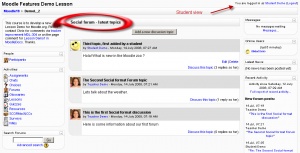Course formats: Difference between revisions
| Line 37: | Line 37: | ||
The social forum can be edited by clicking the 'Update this forum' button on the social forum page. The forum introduction is displayed at the top of the course page (in Moodle 1.9.5 onwards). | The social forum can be edited by clicking the 'Update this forum' button on the social forum page. The forum introduction is displayed at the top of the course page (in Moodle 1.9.5 onwards). | ||
===Weekly format, CSS/no tables=== | ===Weekly format, CSS/no tables=== | ||
Revision as of 23:23, 6 December 2011
A course format refers to the layout of a course. They can be changed by the course Course administration block under settings.
Standard course formats
Pacing for 2012 Academic Year
Elementary Computer Course
January: Students will learn how to use paint tools and insert it in MS Word
February and March: Learning how to make presentations in MS Power Point • Insert pictures • Working with custom animations • Inserting movie clipart • Inserting audio • Working with hyperlinks
April: Learning MS Publisher • Flyers • Posters • Brochure • Banners • Cards May Students will be introduces in the MS Excel program • Surveys • Enter data • Graphic charts
Social format
This format is oriented around one main forum, the social forum, which appears listed on the main page. It is useful for situations that are more free form. They may not even be courses. The Moodle Lounge is an example of a social format course.
The social forum can be edited by clicking the 'Update this forum' button on the social forum page. The forum introduction is displayed at the top of the course page (in Moodle 1.9.5 onwards).
Weekly format, CSS/no tables
The CSS / No Tables variant of the Weekly format displays the Weekly course format without using tables for layout. This improves the accessibility of the format, but older browsers have trouble displaying it correctly. This format is available in Moodle 1.6 onwards.
Contributed course formats
Page format
Also known as Flexpage, this format is very similar to the Book resource format in a Moodle course. It consists of a theme, course format, and menu module which enables blocks and modules to be intermixed on a 3 column layout, provide tab based navigation through course content, inline display of resources and forums, etc. For more information on Flexpage, please visit this site (You can self-register for this Moodle course.) This feature was developed by a Moodle partner Moodlerooms, Inc.
Collapsed Topics and Weeks formats
Collapsed Topics and its sister format, Collapsed Weeks are formats that are essentially the same as the standard Topic (Course_sections#Topics_format) and Weekly (Course_sections#Weekly_format) formats but with a 'toggle' for each section except '0'. The toggles' purpose is to reduce the amount of initial information presented to the user thus reducing the 'scroll of death' that can plague courses with a lot of content. The 'state' of the toggles is remembered on a per course per user basis. Collapsed Weeks automatically opens the current week. There are versions available for Moodle 1.8, 1.9 and 2.0. For more information, please visit Collapsed_Topics_course_format and Collapsed_Weeks_course_format.
See also
- Course settings
- Using Moodle Course formats forum
- Getting the most out of course design blog post describing various contributed course formats
Using Moodle forum discussions:
